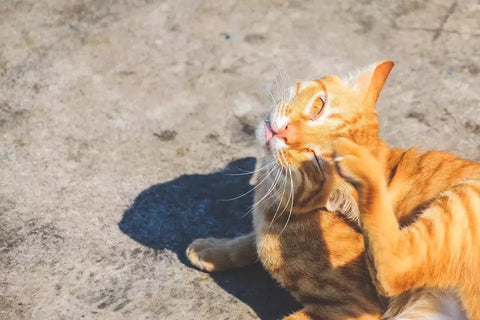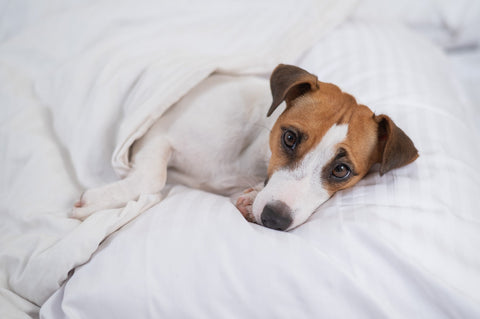Cancer in dogs can be both difficult and confusing, especially when it involves our furbabies. As pet parents, we wish our pets all the best things in the world and cancer just kind of ruins the healthier and happier life we hope they could live with.
Detecting cancer in its early stages can be quite a challenge but know that there are things you can actually look for in your pet so that veterinary attention can be given immediately.
What causes cancer in dogs?
If ever your furbaby has just been diagnosed with cancer, we're pretty sure you're asking yourself what you could've done to prevent it. Though there still aren't enough studies to support the claim, cancer in dogs is commonly linked with in-breeding, diet, and lifestyle.
"Cancer can occur in any of your dog's body parts or organs and depending on where the cancer is growing, signs and symptoms of cancer in dogs can differ."
Symptoms of cancer in dogs
Cancer can occur in any of your dog's body parts or organs and depending on where the cancer is growing, signs and symptoms of cancer in dogs can differ and it can also cause an array of different diseases.
Diagnosing cancer in dogs can't rely on the symptoms alone as it may be other signs of illnesses, too. But the following are some of the most common symptoms of cancer in dogs and a sign, too, that you should probably take your dog to the vet immediately, too, to be able to make a proper diagnosis.
Growth of lumps or masses
One of the most common signs of cancer in dogs is a sudden growth of a lump or a mass in different body parts of your furbaby. These are seen mostly on the paw pads or on the legs of your dog. Your vet will then perform a biopsy on these lumps or masses to see if it's somewhere near malignant. You should also be observant and keen on how big it is growing or is it even getting bigger (at all) as time passes by.
Unusual odors
No dogs (in the world) have good breath. They all smell different and they all don't smell good, but can be tolerated. If ever you suddenly observed that your dog is releasing a foul and really bad odor from his mouth even when you're grooming him and constantly brushing his teeth or giving him Gnawtlers to chew on, it could be a cancer sign! Gnawtlers are chews that are specially selected from premium and raw elk and deer antlers. Unlike other antler chews in the market, these Gnawtlers are jam-packed with nutrients like calcium, manganese, and zinc. It also serves as a healthy treat for your dog!
Abnormal discharge
An unusual amount of blood or pus coming out of your furbaby's lump, mass or private organ can be a sign of cancer, too. Relay this information to your vet immediately.
Sudden weight loss
One of the symptoms of cancer in dogs is sudden weight loss, a decrease of appetite, difficulty in swallowing his food, and unusual laziness and lethargy could be signs that something is wrong with your furbaby. These types of changes in your dog's behavior can indicate a variety of different illnesses, including cancer.
Difficulty in urinating
Major changes in your dog's peeing behavior are a cancer indicator, especially in the kidneys or bladder is also one of the symptoms of cancer in dogs. Observe if ever your furbaby is relieving herself less regularly or if she's hurting whenever she's peeing.

Non-healing wounds
Any wounds or skin erosion that don't seem to get better over time even if you've applied almost all possible treatments, is a cancer indicator, too!
Treatment and management of cancer in dogs
There are actually treatments and managements you can do to make your furbaby's life a little bit less miserable. First, the treatments. Treatments can vary from surgery, chemotherapy, and radiotherapy. These treatments require you to visit your vet frequently as these are given at specific time intervals.
- Surgery.This is usually done for the removal of tumors, lumps, masses, etc.
- Chemotherapy.This is usually performed after a surgery to remove all remaining cancer cells in your furbaby's body, in case it might have spread.
- Radiotherapy. This kind of treatment is only available in certain specialist centers. It uses high-energy rays, such as x-rays, to treat cancer and destroys cancer cells in the body part where it is given.
Second, are the management. If your furbaby has been diagnosed with the big C, here are some of the things you can do to help her cope up and get through it:
Provide multivitamins Though it can't cure cancer, it will provide your pet with enough nutrition to face the day and will help boost your furbaby's body. But remember to consult your vet first if it's okay to give her multivitamins as some supplements may contradict cancer medications. Take note, too, that multivitamins are all that they are - supplements. It does not, in any way, guarantee to cure cancer.
Steer clear of a toxic environment.The big C is enough for your dog to handle, that's why you should make sure that whatever is in her surrounding is not stressing her. Keep her away from loud noises, other pets at home that may get nosy, stray animals, and even away from your guests she's never seen before.
You can provide dog diapers, bands, and pee pads for your furbaby as these can make an environment more comfortable so your dog doesn't have to leave her safe space as often, it also saves you and your home from accidental messes and cleanups.
Knowing that your dog has cancer is one of the biggest heartbreaks a pet parent can encounter. But know that the big C isn't the end of everything because your dog can still get better and live the happier and healthier life you wish for your furry friend.









